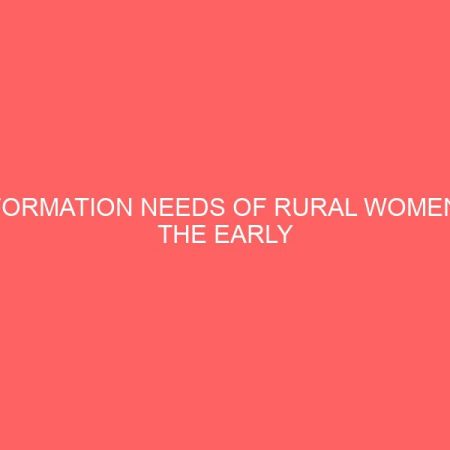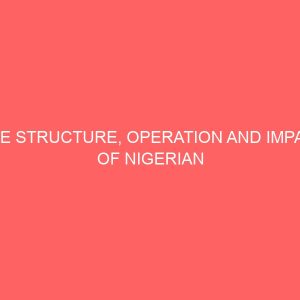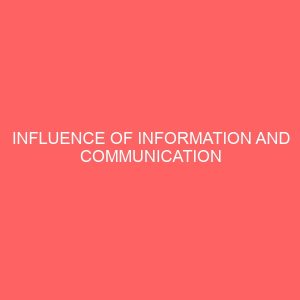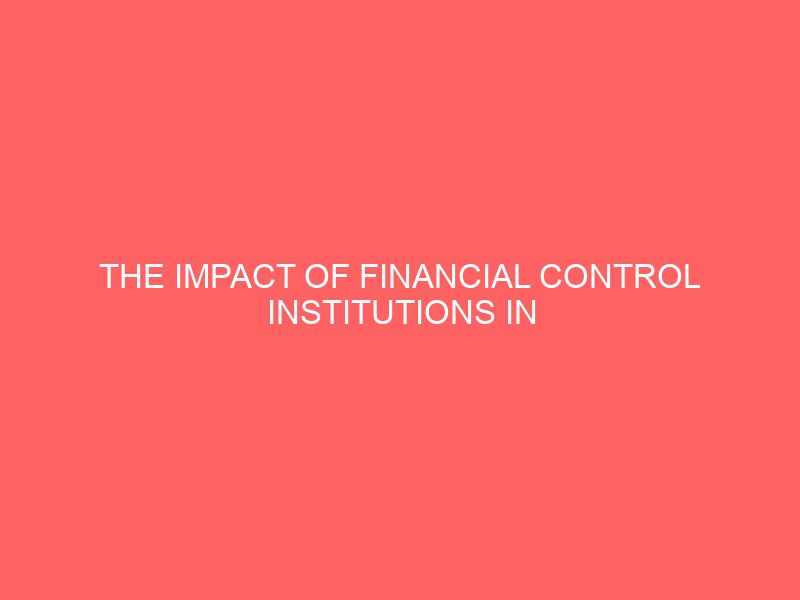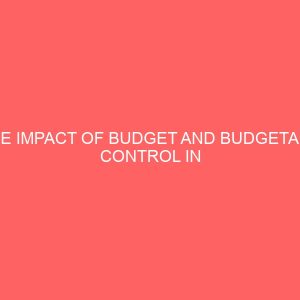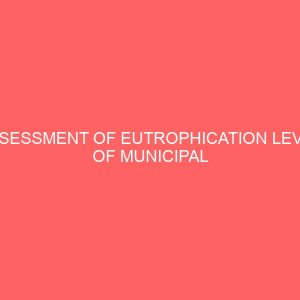Description
THE IMPACT OF FINANCIAL CONTROL INSTITUTIONS IN PROMOTING FINANCIAL ACCOUNTABILITY IN NIGERIA: A STUDY OF IMO STATE NIGERIA UNDER DEMOCRATIC REGIMES
CHAPTER ONE
INTRODUCTION
1.1 BACKGROUND TO THE STUDY
Nigeria has been divided into six geo-political zones – South-South, South-West, South- East, North- East, North -West and North- Central. IMO State falls within the geo-political zone of North-Central. The State was first created as Benue-IMO in 1967. It later became IMO State with the creation of Benue State in 1976. Nassarawa State was also created out of IMO State in 1996.
The Nigerian public sector consists of the governments at the Federal, States, Federal Capital Territory, Local Governments and all government parastatals. The public sector plays an important role in economic development. It provides services which the private sector may not be willing or able to provide. Chan (1988:15) argues thatthe public sector provides many essential services to society. It plays an essentially compensatory function; that is, it performs those functions that the market economy does not do efficiently or lacks the incentive to do at all.
Musgrave and Musgrave (1976) classify these functions as;
- Resource Allocation: The provision of public goods and services.
- Income Distribution: The adjustment of the distribution of wealth or income in the society to conform to some principle of fairness.
- Stabilization: The use of fiscal policies to achieve high employment, price stability and economic growth.
In a Federal system like Nigeria, the different tiers of government perform these functions in varying degrees. Governments at all levels desire to deliver good governance to all their citizens. This is because “good governance is central to creating and sustaining an enabling environment for development” (Asselin, 1995:3). A strong link exists between economic development and good governance, and between good governance and fiscal transparency.
The importance of good financial management in achieving the objectives of government has not lost its relevance. Because of this, the financial accountability of most countries is enshrined in the Constitution to facilitate the discharge of financial accountability. Oshisami and Dean (1984:36) remark thatin recognition of the importance of finance as a basis for political power, and the opportunities which absolute control offers for its abuse, power over finance is divided, the division being formally recognized constitutionally in virtually all countries Global practice shows that power over finance is shared between the Executive and the legislature and in some cases with an independent body – the Supreme Audit Institution. Has this Constitutional sharing of power over finance achieved the desired result? In view of the enormous responsibilities placed on government for the welfare of its citizens, the public sector needs a lot of resources. In pursuit of this, the government needs to put up a framework for the management and control of the public purse. The formalities established in relation to accounting and financial control support the process of governance
- Financial Control
The term ‘control’ has long been recognized as one of the principles of management. Control exists in most human endeavors. Most authorities agree on what constitutes control. Lucey (1996:137) states that control is concerned ‘with the efficient use of resources to achieve a previously determined objective, or set of objectives, contained within a plan’. Similarly, Koontz, Donnel and Wiehrick (1980:81) define control as the measurement and correcting of activities of subordinates to assure that events conform to plans. Ekwonu (1996:35) states that control ‘is the measurement of the performance of the activities of subordinates in order to make sure that objectives and plans devised to attain them are being accomplished’. All these definitions point to the fact that control exists to ensure that organizational objectives are met through measurement of performance. The control process according to (Koontz et al 1980:722) involves three steps:
- Establishing standards
- Measuring performance against these standards and
- Correcting deviations from standards and plans
Finance occupies a special place in the conduct of government business. Public finance has been defined by Buhari (1993:66) as ‘a branch of economics concerned with the finance and economic activities of the public sector’.
From these definitions, we can state that public finance not just deal with the ways government raises money, but also the manner such money is expended with the aim of achieving economic growth.
In Nigeria, the Federal government raises money through the following major sources: Petroleum profit tax, Mining, Company income tax, Import duties, Export duties, Excise duties, Interest and repayment of loans granted by the government (Buhari, 1993:169).
Others include; Education tax, Value added tax, Pay-as-you-earn, Fees and charges, Royalties, Rent of government property, Grants, aids and loans.
The money raised through the above sources is expended on the following items: Administration, Infrastructural services, Productive services, Defense, Interest on internal and external loans, and Diplomatic missions (Buhari, 1993:168).
In connection with government finance, we can identify two basic groups of control- administrative and financial control; the former referring to those techniques which have indirect bearing upon expenditure operation while the latter denote techniques of control relating to fiscal control. The emphasis of this study is on financial control.
Financial control is a very important type of control in the management of government finance. Oshisami (1992:29) defines it as the process which ensures that financial resources are obtained at cost considered to be economical and utilized efficiently and effectively for the attainment of established objectives.
A comprehensive definition of financial or fiscal control is given by Ekwonu (1996:33) as
the sum total of the work, which guides, directs and interprets the budget cycle. It covers the activities of the Executive branch, involving finance and the ministries… the audit department and the legislature…
In a democratic era, financial control may operate internally and externally.
Within the Executive arm of government control by the finance ministry is internal while audit by the Auditor-General and legislative oversight constitute external control.
- STATEMENT OF THE PROBLEM
Control of public finance is very important to public governance. That is why power over public finance is enshrined in the Nigerian Constitution. To promote financial accountability in IMO State, power over finance is shared between the Executive, Legislature and the Supreme Audit Institution or the Office of the Auditor General. Have these institutions been able to play the roles assigned to them?
It is observed that there is the problem of non or partial implementation of the budget by the Executive arm of government in IMO State. The budget is the legislative instrument of control over public finance.
Related to the issue just raised above, is the problem of spending without legislative authority. The checks and balances on public finance requires that the
Executive cannot spend without legislative approval. Even where voted funds fall short of requirements, the spending agency must apply for supplementary appropriations provisions and obtain legislative approval for such additional expenditure before incurring them. It has been alleged that this requirement of the law is not usually followed.
The Executive arm of government which implements budgets is required to ensure that expenditures are properly covered in the relevant Appropriation Acts. Funds are supposed to be apportioned to spending departments in line with the approved budget. It has been noted that public expenditure are frequently made on items not budgeted for, which of course means that such expenditure have no legislative approval. Once the budget has been approved, it is alleged that funds are shifted to purposes other than those for which they were meant.
Limits of expenditure are imposed by the budget. However, spending agencies do not observe these limits when incurring expenditure. In the course of budget implementation, a vote book is maintained to ensure that approved budgetary limits are not exceeded. This aspect of expenditure control is often abused. We may ask, why should spending agencies not respect limits when incurring expenditure? With all these abuses, what has happened to the legislative oversight function?
The performance of the Auditor General in IMO State has been called to question. It is alleged that the Auditor General is incapable of discharging the functions of his office which is constitutionally prescribed. If this is true, why?
The IMO State Legislature is seen to be weak and unable to discharge its constitutional responsibility of exercising its power of financial oversight on the
Executive arm of government. This problem is alleged to have adverse effects on the performance of the State Auditor General.
Public financial control in IMO State also suffers from poor financial record keeping. Where financial records are poorly maintained, can the reliance of the Auditor General on these records adversely affect his performance? In addition, if it is true that financial records are poorly maintained in IMO State, is this a function of the qualification of those who keep these records? How do these problems listed above impact on financial accountability in IMO State?
- Research Questions
The questions of this research are as follows:
- Is the Budget a significant instrument of Legislative control over public finance in IMO State?
- Are the rules and regulations governing the use of public funds being observed in IMO State?
- Does the quality of legislative financial oversight enhance the performance of State Auditors?
- Does the reliance of the Auditor-General on financial statements prepared by the Executive enhance his performance?
- Is there any relationship between educational/professional qualification and the number of financial records kept in IMO State?
- Do the formal institutions of financial control play their roles as spelt out by the Constitution?
- OBJECTIVES OF THE STUDY
This research sets out to evaluate the role of the formal institutions of financial control over public finance in IMO State. Specifically the research has the following objectives:
- To evaluate the significance of the public budget as an instrument of legislative control over public finance in IMO State.
- To determine whether the reliance of the Auditor-General on the financial data supplied by the Executive enhances his audit work.
- To examine the quality of legislative oversight function on State Audit performance.
- To investigate the significance of the qualification of Treasury staff on the number of financial records kept.
- To recommend measures on how to improve financial accountability in IMO State.
- HYPOTHESES OF STUDY
Hypothesis One
Ho: The public budget is not a significant instrument of Legislative control over public finance in IMO State.
H1: The public budget is a significant instrument of Legislative control over public finance in IMO State.
RATIONALE/JUSTIFICATION
The budget is an expression of legislative approval on how public funds should be disbursed. Budget implementation is used to judge the Executive’s conformance to this legislative approval.
This hypothesis is formulated to find out whether or not the Executive complies significantly with Legislative approval during budget implementation.
Hypothesis Two
Ho: The performance of the Auditor-General is not significantly dependent on the financial statements prepared by the Executive arm of government.
H1: The performance of the Auditor-General is significantly dependent on the financial statements prepared by the Executive arm of government.
RATIONALE/JUSTIFICATION
The Auditor-General is an agent of the Legislature. The Auditor-General has the duty of overseeing the management of public funds and the quality and credibility of governments’ reported financial data. The Auditor-General ensures that the budget is implemented according to legislative approval. This hypothesis will reveal whether or not the Auditor-General is able to exercise his duties inspite of his reliance on the financial statements prepared by the Executive.
Hypothesis Three
Ho: State Audit performance is not significantly dependent on the quality of legislative financial oversight.
H1: State Audit performance is significantly dependent on the quality of legislative financial oversight.
RATIONALE/JUSTIFICATION
This hypothesis seeks to establish whether the quality of legislative oversight (through its public accounts committee) has any influence on State Audit work. Does the quality of legislative financial oversight influence the work of State Auditors?
Hypothesis Four
Ho: There is no significant difference between the qualification of treasury operating staff and the number of financial records kept.
H1: There is significant difference between the qualification of treasury staff and the number of financial records kept.
RATIONALE/JUSTIFICATION
Where there is a culture of poor financial record keeping, no meaningful control can be exercised. Good financial record keeping is a necessary condition for the production of auditable financial statement. The aim of this hypothesis is to evaluate whether qualification has a significant effect on financial record keeping in IMO State.
- SIGNIFICANCE OF THE RESEARCH
A research on the public sector, especially on financial control is very important. This research is significant in a number of ways.
The research will assist financial policy makers in IMO State and indeed other States in Nigeria formulate policies that will promote financial accountability. The academic community will benefit tremendously from this research. Other researchers may use this research to investigate further issues on public finance control.
The three formal institutions of financial control in IMO State, that is, the Executive, the Legislature and the Auditor General will discharge their financial responsibilities effectively if the recommendations of this research are implemented.
- RESEARCH SCOPE
This research evaluates the role of the formal institutions of financial control over public finance under a democratic setting. This is because the institutions of financial control are fully operational only during democratic dispensations. The Legislature does not exist during military rule.
The role of the informal institutions of financial control such as the media, the organised civil society and international donor agencies though important are not the immediate focus of this research.
IMO State which is chosen as the case study is an old State – first created as Benue-IMO State in 1967. The State has witnessed flashes of democratic rule from 1979 to date.
The research period covers years under democratic regimes. These are 19791983; 1991-1992; and 1999-2003. The research period covers ten years of democratic rule. The broken periods are periods of military rule.
The research covers only ministries. Parastatals are excluded because the 1999 Constitution S. 85 (3) does not authorize the Auditor-General to audit or appoint external auditors for government parastatals. Local governments are also excluded since they are guided by a different financial rule called the financial memoranda.
- RESEARCH LIMITATIONS
A number of limitations were encountered in this research. The major ones included:
- Literature Review – Getting materials for literature review was difficult – An extensive search for literature took over one year. The cost incurred in obtaining the relevant materials was also enormous.
- Questionnaire Administration – During the main research, we had to deal with an enlarged number of participants in the research. Since the questions were randomly administered, many of the participants were seeing the questions for the first time. Many of them felt that participating in this research would amount to “leaking of government secret”. They were visibly uncomfortable – that was even in spite of assurances given by research assistants that the information required was strictly for research purposes. Some of them asked for time to make up their minds as to whether to complete the questionnaires. For this category of respondents, research assistants had to plead and make repeated visits before the questionnaires were completed and returned.
- Secondary Data Collection – Getting information on public sector activity is difficult. But it is even more difficult getting information on financial activities. Information that is supposed to be publicly available is treated as confidential. Enquiries for financial information are viewed with suspicion. A very high official must authorize the release of such financial information. But getting such an official to authorize the release of the information is pretty difficult. The research assistants were suspected to be agents of opposing political parties. They were thus to be kept at arms’ length. It took a long time to convince the custodians of the required information to release the information.
- State of Emergency – The state of emergency declared in IMO State on the 18th of May 2004 adversely affected this research. The IMO State House of Assembly, it will be recalled was also suspended during the period. Reaching out to the suspended members to participate in the research was difficult. Even where contacts were established eventually, completing the questionnaire was not seen to be of any immediate importance. Some of the lawmakers told me that their immediate concern was whether they would be reinstated. They eventually participated. Democratic structures were restored at the end of the state of emergency in November 2004. To God be the glory.


